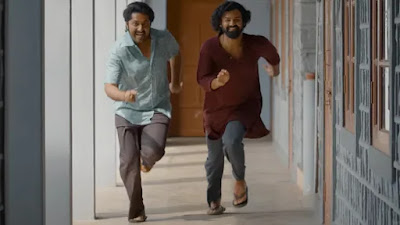For once our heroes pass into the Madras film business - versatile Venu seeing his enthusiasms embraced, Murali watching as his are subsumed and turned against themselves - VS gets both broader and more familiar. On a scene-by-scene basis: Sreenivasan has modest fun recreating the kind of movies that were made in a certain place at a particular time, as per everything from Singin' in the Rain to last year's Hindi TV standout Jubilee. In terms of characterisation, where Murali has been drawn along time-honoured, rather careworn lines as the self-loathing virtuoso who duly pisses his talent away. And in terms of overall shape, too: we pass through break-up, reunion and eventual comeback, each encountered more or less where you'd expect them to be in a film of this type. Sreenivasan pulls off individual coups here and there, such as the creation of a signature song (the movie's equivalent of "Shallow" or "That Thing You Do!") which flows through the drama, becoming the making of one creative and the undoing of another. There's still poetry present, in other words, but its lines and cadences become far less distinct, the script struggling to distinguish its behind-the-scenes war stories from the many others we've seen and heard. Late on, that poetry is replaced by Reels: local favourite Nivin Pauly injects some welcome energy as "Nivin Molly", the social media-addicted megastar headlining Murali and Venu's belated comeback vehicle. Even here, though, VS presents as inflexibly male: it could badly do with a Debbie Reynolds to set alongside its Kelly and O'Connor, the better to stop it hammering insistently away at the same nostalgic notes. For while the film remains genial in its backslapping, it's also two hours and forty-five minutes of men paying tribute to themselves, their genius, their hurt and resilience; while that's no doubt true to the structure and composition of the Malayalam film industry as it was at the millennium, in 2024 it also comes with a real air of locker-room fustiness. The great South Indian films of the past few years have demonstrated a heightened, bustling sense of community, both before and behind the camera. Sreenivasan gets some of that collective magic up on screen, but he's rather keener than you might like to frame it within the context of what is almost exclusively a boys' club.
Varshangalkku Shesham is now playing in selected cinemas.

No comments:
Post a Comment